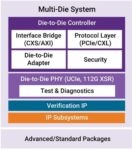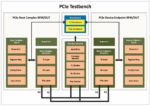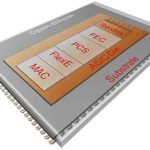The demand for high-bandwidth, low-latency networking solutions has never been greater. As artificial intelligence (AI) workloads continue to grow exponentially, and hyperscale data centers become the backbone of our digital infrastructure, the need for faster and more efficient communication technologies becomes imperative.… Read More
Tag: phy
Accelerate AI Performance with 9G+ HBM3 System Solutions
In the technology realm of artificial intelligence (AI) and high-performance computing (HPC), the demand for higher throughput and efficiency has never been greater. To meet these evolving demands, innovative memory solutions have emerged as critical enablers, paving the way for transformative advancements in computing… Read More
Chiplet Interconnect Challenges and Standards
For decades now I’ve watched the incredible growth of SoCs in terms of die size, transistor count, frequency and complexity. Instead of placing all of the system complexity into a single, monolithic chip, there are now compelling reasons to use a multi-chip approach, like when the maximum die size limit is reached, or it’s… Read More
PCIe Gen 6 Verification IP Speeds Up Chip Development
PCIe is a prevalent and popular interface standard that is used in just about every digital electronic system. It is used widely in SOCs and in devices that connect to them. Since it was first released in 2003, it has evolved to keep up with rapidly accelerating needs for high speed data transfers. Each version has doubled in throughput,… Read More
Die-to-Die Connections Crucial for SOCs built with Chiplets
If you ascribe to the notion that things move in circles, or concentrically, the move to die-to-die connectivity makes complete sense. Just as multi-chip modules (MCM) were the right technology decades ago to improve power, areas, performance and cost, the use of chiplets with die-to-die connections provides many advantages… Read More
USB 3.2 Helps Deliver on Type-C Connector Performance Potential
Despite sounding like a minor enhancement version for USB, USB 3.2 introduces many important changes for the USB specification. To see where USB has come from and where it is going, it is essential to look at what is found in USB 3.2. The other salient point is that now the Type-C connector has split out from the underlying USB specification… Read More
Synopsys’ New Die-to-Die PHY IP – What It Means
This morning, Synopsys announced its new Die-to-Die PHY IP. This announcement is critically important as it addresses two major market drivers – the growing need for faster connectivity in the datacenter and similar markets, and a path to better exploit the latest processes by dealing with yield issues for larger dies in a different… Read More
Ethernet Enhancements Enable Efficiencies
Up until 2016, provisioning Ethernet networks was a little bit like buying hot dogs and hot dog buns, in that you could not always match up the quantities to get the most efficient configuration. That dramatically changed when the specification for Ethernet FlexE was adopted by the Optical Internetworking Forum as OIF-FLEXE-01.0.… Read More
Data Center Explosion Push for Fast Adoption of 25G
The data center rack server market is estimated to growat a high Compound Annual Growth Rate (CAGR) of 20% to reach $90 billion by 2021. Such growth is due to the significantly rise in the number of connected devices, the growth in the volume of data per device and theneed for quick processing of high-volume data. Much of these data … Read More
16nm HBM Implementation Presentation Highlights CoWoS During TSMC’s OIP
Once a year, during the TSMC’s Open Innovation Platform (OIP) Forum you can expect to see cutting edge technical achievements by TSMC and their partners. This year was no exception, with Open-Silicon presenting its accomplishments in implementing an HBM reference design in 16nm. It’s well understood that HBM offers huge benefits… Read More









